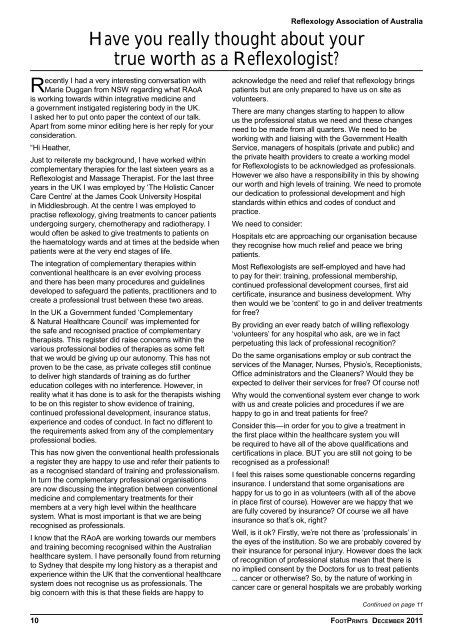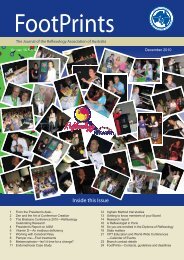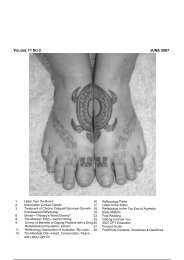FootPrints_Dec_11_Vol_15_No4.pdf 3266KB Apr 26 2013 03:57:58 ...
FootPrints_Dec_11_Vol_15_No4.pdf 3266KB Apr 26 2013 03:57:58 ...
FootPrints_Dec_11_Vol_15_No4.pdf 3266KB Apr 26 2013 03:57:58 ...
You also want an ePaper? Increase the reach of your titles
YUMPU automatically turns print PDFs into web optimized ePapers that Google loves.
Reflexology Association of Australia<br />
Have you really thought about your<br />
true worth as a Reflexologist?<br />
Recently I had a very interesting conversation with<br />
Marie Duggan from NSW regarding what RAoA<br />
is working towards within integrative medicine and<br />
a government instigated registering body in the UK.<br />
I asked her to put onto paper the context of our talk.<br />
Apart from some minor editing here is her reply for your<br />
consideration.<br />
“Hi Heather,<br />
Just to reiterate my background, I have worked within<br />
complementary therapies for the last sixteen years as a<br />
Reflexologist and Massage Therapist. For the last three<br />
years in the UK I was employed by ‘The Holistic Cancer<br />
Care Centre’ at the James Cook University Hospital<br />
in Middlesbrough. At the centre I was employed to<br />
practise reflexology, giving treatments to cancer patients<br />
undergoing surgery, chemotherapy and radiotherapy. I<br />
would often be asked to give treatments to patients on<br />
the haematology wards and at times at the bedside when<br />
patients were at the very end stages of life.<br />
The integration of complementary therapies within<br />
conventional healthcare is an ever evolving process<br />
and there has been many procedures and guidelines<br />
developed to safeguard the patients, practitioners and to<br />
create a professional trust between these two areas.<br />
In the UK a Government funded ‘Complementary<br />
& Natural Healthcare Council’ was implemented for<br />
the safe and recognised practice of complementary<br />
therapists. This register did raise concerns within the<br />
various professional bodies of therapies as some felt<br />
that we would be giving up our autonomy. This has not<br />
proven to be the case, as private colleges still continue<br />
to deliver high standards of training as do further<br />
education colleges with no interference. However, in<br />
reality what it has done is to ask for the therapists wishing<br />
to be on this register to show evidence of training,<br />
continued professional development, insurance status,<br />
experience and codes of conduct. In fact no different to<br />
the requirements asked from any of the complementary<br />
professional bodies.<br />
This has now given the conventional health professionals<br />
a register they are happy to use and refer their patients to<br />
as a recognised standard of training and professionalism.<br />
In turn the complementary professional organisations<br />
are now discussing the integration between conventional<br />
medicine and complementary treatments for their<br />
members at a very high level within the healthcare<br />
system. What is most important is that we are being<br />
recognised as professionals.<br />
I know that the RAoA are working towards our members<br />
and training becoming recognised within the Australian<br />
healthcare system. I have personally found from returning<br />
to Sydney that despite my long history as a therapist and<br />
experience within the UK that the conventional healthcare<br />
system does not recognise us as professionals. The<br />
big concern with this is that these fields are happy to<br />
acknowledge the need and relief that reflexology brings<br />
patients but are only prepared to have us on site as<br />
volunteers.<br />
There are many changes starting to happen to allow<br />
us the professional status we need and these changes<br />
need to be made from all quarters. We need to be<br />
working with and liaising with the Government Health<br />
Service, managers of hospitals (private and public) and<br />
the private health providers to create a working model<br />
for Reflexologists to be acknowledged as professionals.<br />
However we also have a responsibility in this by showing<br />
our worth and high levels of training. We need to promote<br />
our dedication to professional development and high<br />
standards within ethics and codes of conduct and<br />
practice.<br />
We need to consider:<br />
Hospitals etc are approaching our organisation because<br />
they recognise how much relief and peace we bring<br />
patients.<br />
Most Reflexologists are self-employed and have had<br />
to pay for their: training, professional membership,<br />
continued professional development courses, first aid<br />
certificate, insurance and business development. Why<br />
then would we be ‘content’ to go in and deliver treatments<br />
for free?<br />
By providing an ever ready batch of willing reflexology<br />
‘volunteers’ for any hospital who ask, are we in fact<br />
perpetuating this lack of professional recognition?<br />
Do the same organisations employ or sub contract the<br />
services of the Manager, Nurses, Physio’s, Receptionists,<br />
Office administrators and the Cleaners? Would they be<br />
expected to deliver their services for free? Of course not!<br />
Why would the conventional system ever change to work<br />
with us and create policies and procedures if we are<br />
happy to go in and treat patients for free?<br />
Consider this—in order for you to give a treatment in<br />
the first place within the healthcare system you will<br />
be required to have all of the above qualifications and<br />
certifications in place. BUT you are still not going to be<br />
recognised as a professional!<br />
I feel this raises some questionable concerns regarding<br />
insurance. I understand that some organisations are<br />
happy for us to go in as volunteers (with all of the above<br />
in place first of course). However are we happy that we<br />
are fully covered by insurance? Of course we all have<br />
insurance so that’s ok, right?<br />
Well, is it ok? Firstly, we’re not there as ‘professionals’ in<br />
the eyes of the institution. So we are probably covered by<br />
their insurance for personal injury. However does the lack<br />
of recognition of professional status mean that there is<br />
no implied consent by the Doctors for us to treat patients<br />
... cancer or otherwise? So, by the nature of working in<br />
cancer care or general hospitals we are probably working<br />
Continued on page <strong>11</strong><br />
10 FOOTPRINTS DECEMBER 20<strong>11</strong>
















